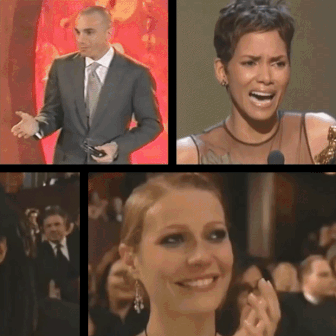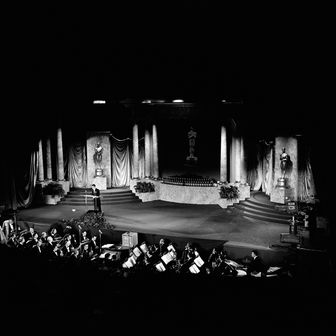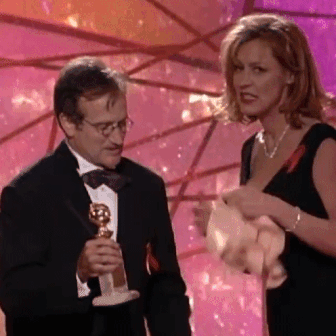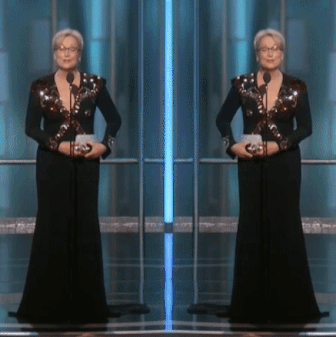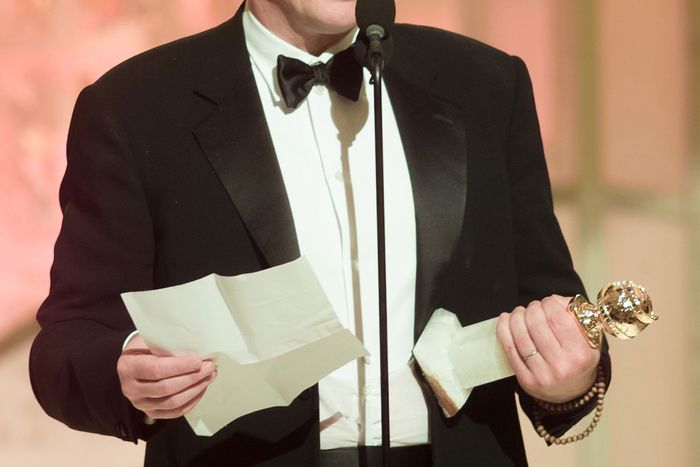
What’s the point of the Golden Globes? Besides the opportunity to put a bunch of tipsy celebrities in a room together so we can all read their lips, precursor ceremonies like the Globes and the SAG Awards function as an unofficial dress rehearsal for the Oscars. Bring down the house with a stirring acceptance speech in January, the thinking goes, and voters will want to see you reprise it in March.
But is the reverse also true? Can giving a bad acceptance speech lose you an Oscar?
On one level, it’s an impossible question to answer. There’s no way of knowing for sure why a given contender lost. And history hasn’t supplied an excess of examples. Unlike, say, opening monologues, it’s rare that you see a truly terrible acceptance speech. I can think of occasions like the 2019 Golden Globes, where The Wife’s Glenn Close gave a merely good speech on a night where her best actress rival, Olivia Colman of The Favourite, happened to give a great one. But that’s not the same thing. A winning campaign requires a precise intersection of film, narrative, and moment — can it really be derailed by the small matter of a speech? Pundits ho-hummed Ariana DeBose’s SAG acceptance speech in 2022, and that didn’t stop the West Side Story star from waltzing away with the best supporting actress Oscar. (Besides, we’ve since seen what happens when DeBose tries a big swing at an awards ceremony.)
Nevertheless, it’s an intriguing query. So on my travels on the awards circuit last week, I asked the pundits and strategists who think about these things for a living if they could recall anyone’s chances cratering thanks to an ill-advised acceptance speech.
The most recent example came from pundit Matt Neglia, who pinpointed a speech from just last year. When Cate Blanchett won best actress at the Critics’ Choice Awards for Tár, she was locked in a neck-and-neck race with Everything Everywhere All at Once’s Michelle Yeoh. Both women had split the best actress honors from critics groups, and they’d both won Golden Globes the weekend before. Blanchett began her speech by shouting out all the other women who’d given standout performances that year — never a bad rhetorical move — but then started freestyling about the ridiculousness of awards season itself, condemning the “patriarchal pyramid” pitting women against each other, and begging to “stop the televised horse race.”
Coming from an actress who had been a full participant in the awards circus thus far, the speech rubbed many viewers the wrong way. But wait, hadn’t Joaquin Phoenix expressed similar sentiments during his Joker campaign? That was different, Neglia told me. Phoenix took his shots but always in the context of everyone, including himself, needing to do better. (I’d venture there may have been another reason Academy members were more likely to accept a lecture from Phoenix, but I can’t put my finger on X-actly Y.) Perhaps Blanchett, who already had two Oscars, was trying to signal that she didn’t need a third. Or maybe she was just tired after four months of nonstop campaigning. Regardless, though she would later win the BAFTA, Yeoh took home the Oscar*.
A studio publicist offered another example from a ceremony that wasn’t televised. When A Star Is Born’s Lady Gaga accepted her best actress honor at the 2018 National Board of Review gala, she ascended the podium and stayed there for 13 minutes. It wasn’t a bad speech, and expectations for brevity are a little more relaxed at non-televised events. But still — 13 minutes! Six-and-a-half minutes in, she seemed like she was wrapping up; little did those in the room know they were only halfway through. Combined with her ubiquitous “100 people in a room” quote, the extra-long speech helped mark Gaga as an awards-season arriviste. While there were plenty of reasons A Star Is Born underperformed, that impression goes some way to explaining why a performance that initially seemed a threat to take the trophy wound up taking a backseat to the Close vs. Colman showdown. “People didn’t really want to give her another award after that,” the publicist said.
I was interested to hear from Michael Schulman, author of the recent book Oscar Wars: A History of Hollywood in Gold, Sweat, and Tears. He answered with a speech I had completely forgotten: Richard Gere at the 2003 Golden Globes, where he won best actor in a musical/comedy for Chicago. As Schulman explained, parts of this speech are awkward to watch now, because Gere spoke at length about “the kindly, wonderful, gentle man” who distributed the film: Harvey Weinstein.
As Peter Biskind would later write in Down and Dirty Pictures, some in the industry left that night convinced Gere was performing as Weinstein’s ventriloquist dummy. “This is a good man,” he said about the future convicted sex criminal. “People don’t know that, but he’s done a lot of good things in life.” While it would be unfair to judge the speech by the standards of 2024, it was still weird in 2003 — The New Yorker had just published an exposé on Weinstein’s penchant for violent threats, which Gere alluded to in his speech. “Go write an article about that, New Yorker,” he said, adding a malevolent growl.
Even putting aside the Weinstein of it all, the speech was also excruciatingly long. Gere spoke for four-and-a-half minutes, an eternity by today’s don’t-you-dare-go-past-11:30 ethos. (By contrast, Jack Nicholson’s Valium-aided speech for best actor in a drama lasted a mere two minutes.) The first minute was vamping, as the actor explained that he hadn’t expected to win. Finally, he produced from his jacket a list of people to thank, accidentally emptying his pockets on the floor in the process. Only then did Gere begin the processional of names, which, as Entertainment Weekly sniffed, encompassed “virtually everyone he’d ever met.”
There was a sense that Gere was already on thin ice, awards-wise, thanks to a stunt he’d pulled at the Oscars a decade earlier. Presenting the award for best art direction, he’d ignored the prepared text and instead suggested the audience send a psychic message to Deng Xiaoping asking him to end the Chinese occupation of Tibet. Still, the guy had won the Globe and been nominated at SAG. When the Oscar nominations came out a few weeks later, Chicago led the field with 13, but Gere was not among them. One insider told Biskind they thought Gere’s “toadyish” Globes speech had “cost him the nomination.”
Of course, that insider was Scott Rudin. So maybe, when we talk about bad speeches tanking Oscar chances, it’s still good to consider the source.
*This post originally misstated Cate Blanchett’s awards record at the 2023 precursor.
More From This Series
- A Guide to Playing Off Winners at Awards Shows
- Christine Lahti on That Time She Was in the Bathroom When She Won a Golden Globe
- The 50 Greatest Awards-Show Speeches of the Last 55 Years


